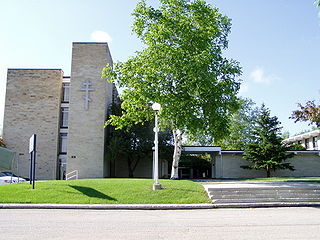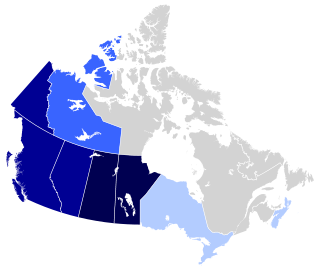Related Research Articles

The University of Manitoba is a Canadian public research university in the province of Manitoba. Founded in 1877, it is the first university of western Canada.
American studies or American civilization is an interdisciplinary field of scholarship that examines American literature, history, society, and culture. It traditionally incorporates literary criticism, historiography and critical theory.

Red River College Polytechnic is a college located in Winnipeg, Manitoba, Canada. It is the province's largest institute of applied learning and applied research, with over 200 degree, diploma, and certificate programs, and more than 21,000 students annually.

The University of Winnipeg is a public research university in Winnipeg, Manitoba, Canada. It offers undergraduate programs in art, business, economics, education, science and applied health as well as graduate programs. UWinnipeg's founding colleges were Manitoba College and Wesley College, which merged to form United College in 1938. The University of Winnipeg was established in 1967 when United College received its charter.

Brandon University is a university located in the city of Brandon, Manitoba, Canada, with an enrolment of approximately 3,375 (2020) full-time and part-time undergraduate and graduate students. The current location was founded on July 13, 1899, as Brandon College as a Baptist institution. It was chartered as a university by then President John E. Robbins on June 5, 1967. The enabling legislation is the Brandon University Act. Brandon University is one of several predominantly undergraduate liberal arts and sciences institutions in Canada.

St. Andrew's College is an institution of the Ukrainian Orthodox Church of Canada and is affiliated with the University of Manitoba in Winnipeg. The college exists to promote spiritual, academic, cultural and moral leadership within the Church, the Ukrainian Canadian community, and the Canadian community.

Ukrainian Canadians are Canadian citizens of Ukrainian descent or Ukrainian-born people who immigrated to Canada.
Jewish studies is an academic discipline centered on the study of Jews and Judaism. Jewish studies is interdisciplinary and combines aspects of history, Middle Eastern studies, Asian studies, Oriental studies, religious studies, archeology, sociology, languages, political science, area studies, women's studies, and ethnic studies. Jewish studies as a distinct field is mainly present at colleges and universities in North America.
Manitoba College was a college that existed in Winnipeg, Manitoba, Canada, from 1871 to 1967, when it became one of the University of Winnipeg and University of Manitoba’s founding colleges. It was one of the first institutions of higher learning in the city of Winnipeg and the province of Manitoba. The first graduating class had 12 members.

St. Paul's College is a Roman Catholic College on the Fort Garry campus of the University of Manitoba in Winnipeg, Mantioba, Canada. It was founded in 1926 by the Oblate Fathers, and became affiliated with the University of Manitoba in 1931. It is the only Catholic higher education institute in the province.
Public folklore is the term for the work done by folklorists in public settings in the United States and Canada outside of universities and colleges, such as arts councils, museums, folklife festivals, radio stations, etc., as opposed to academic folklore, which is done within universities and colleges. The term is short for "public sector folklore" and was first used by members of the American Folklore Society in the early 1970s.
Robert Bohdan Klymasz is a Ukrainian-Canadian folklorist. He was a pioneer in the field and published widely in the English language.

Providence University College and Theological Seminary is an interdenominational Evangelical Christian university college and theological seminary located approximately 50 kilometres southeast of Winnipeg in Otterburne, Manitoba.

A drama school, stage school or theatre school is an undergraduate and/or graduate school or department at a college or university; or a free-standing institution ; which specializes in the pre-professional training in drama and theatre arts, such as acting, design and technical theatre, arts administration, and related subjects. If the drama school is part of a degree-granting institution, undergraduates typically take an Associate degree, Bachelor of Arts, Bachelor of Fine Arts, or, occasionally, Bachelor of Science or Bachelor of Design. Graduate students may take a Master of Arts, Master of Acting, Master of Science, Master of Fine Arts, Doctor of Arts, Doctor of Fine Arts, or Doctor of Philosophy degree.
Assiniboine Community College (ACC) is a Canadian community college in the province of Manitoba. It is accredited by the Manitoba Council on Post-Secondary Education, which was created by the government of Manitoba.

Higher education in Manitoba traces the development and expansion of higher or advanced education in the province of Manitoba.
Booth University College, incorporated as the Salvation Army William and Catherine Booth University College, is a private, Christian liberal arts university college located in downtown Winnipeg, Manitoba, Canada. It is affiliated with the Salvation Army, a Christian organization presently operating in more than 130 countries.
The Immaculate Heart of Mary School (IHMS) is a nursery-to-grade-eight Ukrainian Catholic school in the north end of Winnipeg, Manitoba, Canada.
The University of the State of Paraná is an institution of higher education administered by the Government of the state of Paraná, with a headquartered in the city of Paranavaí, It has campuses in the cities of Curitiba, Apucarana, Campo Mourão, Paranaguá, Paranavaí, São José dos Pinhais and União da Vitória, created by State Law nº 13.283, on October 25, 2001, changed by State law nº 13.358 on December 21, 2001, State Law nº 15.300 on September 28, 2006, and by State Law nº 17.590 on June 12, 2013. It is affiliated with the Science, Technology and Higher Education's Secretary of State.

Kateryna Mykhaylivna Antonovych was a Ukrainian artist, children's book illustrator and professor of art history. She was active in Ukrainian women's and community organizations.
References
- ↑ Kozachenko, Ivan (2016-03-08). "Interview with Roman Petryshyn: Supporting Reforms of Ukrainian Universities and Society". Forum for Ukrainian Studies. Retrieved 2023-09-04.
- ↑ Tomovski, Dimitar (2022-03-09). "U of M stands with Ukrainian community". The Manitoban. Retrieved 2023-09-04.